Mar 15, 2009
Global Warming Skeptics Under Attack, Labeled as Having Mental Disorder
Posted by Pat
More and more anthropogenic global warming skeptics are coming out of the closet. The field of astrophysics, in particular, is replete with doubters about the importance of CO2 in the current context of global temperature rise. The most obvious reason being that the “model” the weathermen use does not contemplate the recent cooling trend. At all. And this development is worrisome to the Warmists. That is because many Warmists are not scientists, or are well outside of their field, or are relative light weights. For instance Dr Willie Soon, an astrophysicist at Harvard writes:
“The most recent scientific evidence shows that even small changes in solar radiation have a strong effect on Earth’s temperature and climate. In 2005, I demonstrated a surprisingly strong correlation between solar radiation and temperatures in the Arctic over the past 130 years. Since then, I have demonstrated similar correlations in all the regions surrounding the Arctic, including the US mainland and China.”

See larger slide here.
“There is no such match between the steady rise in atmospheric CO2 concentration and the often dramatic ups and downs of surface temperatures in and around the Arctic. I recently discovered direct evidence that changes in solar activity have influenced what has been called the “conveyor-belt” circulation of the great Atlantic Ocean currents over the past 240 years. For instance, solar-driven changes in temperature, and in the volume of freshwater output from the Arctic, cause variations in sea surface temperature in the tropical Atlantic 5-20 years later.
These previously undocumented results have been published in the journal Physical Geography. They make it difficult to maintain that changes in solar activity play an insignificant role in climate change, especially over the Arctic.”
“What WILL they think of next? Conference labels skeptics as having mental disorder”
That is right. If you disagree with the warmists then you are mentally ill. “This weekend, the University of West England is hosting a major conference on climate change denial. Strikingly, it’s being organised by the university’s Centre for Psycho-Social Studies. It will be a gathering of those from the top of society - ‘psychotherapists, social researchers, climate change activists, eco-psychologists’ - who will analyse those at the bottom of society, as if we were so many flitting, irrational amoeba under an eco-microscope. The organisers say the conference will explore how ‘denial’ is a product of both ‘addiction and consumption’ and is the ‘consequence of living in a perverse culture which encourages collusion, complacency and irresponsibility’ (1). It is a testament to the dumbed-down, debate-phobic nature of the modern academy that a conference is being held not to explore ideas - to interrogate, analyse and fight over them - but to tag them as perverse.”
Now, the most striking thing about this is that the diagnosis of mental instability has already been made by these organizers. And none of them are equipped to discuss the issue on its merits. Not only are they well outside of their field of study, but even actual knowledge of the subject matter does not seem to be a criteria for participation. Frankly, that sounds a bit crazy to us here at DBKP. Not only are we skeptics, and have duly reported on solar developments over the existence of global warming on this website, but as libertarians, we are concerned about the call for unlimited government intervention in our lives, as well as the apparent desire of Warmists to shut down all energy sources that aren’t considered green.
“The labelling of those who question certain scientific ideas or green ways of life as ‘deniers’, ‘addicts’ and ‘reptiles’ with a ‘baffling’ inability to understand The Science and act accordingly has a deeply censorious bent. If ‘climate change denial’ is a form of mass denial and self-deception, a fundamentally psychological disorder, then there is no need to engage in a meaningful public debate; instead people just need to be treated. Thus the Ecologist says ‘denial cannot simply be countered with information’; indeed there is apparently ‘plentiful historical evidence that increased information may even intensify denial’”
“Psychologising dissent, and refusing to recognise, much less engage with, the substance of people’s disagreements - their political objections, their rational criticisms, their desire to do things differently - is the hallmark of authoritarian regimes.”
Witch Hunt
Now this should be laughable. AGW is a theory. The impact of solar radiation on climate change is a fact. So who are the nut cases? Is it Dr. Soon’s fault that the theory is falling apart? In the minds of these elitists, the answer is yes. And he should be punished. So who is crazy? Read more here.
Icecap notes: If they want to see mental disorder’s firsthand they should look in the mirror or should have been in Copenhagen at last week’s IPCC meeting warm-up where the alarmist claims got so extreme, they had to be reminded that exaggerations would turn more people away and Andy Revkin called it bordering on ‘climate porn’. The professors can also look in their mirror or read When Prophecies Fail which we wrote about here and here and Chris Horner here.
Mar 14, 2009
A New Paper On Solar Climate Forcing “ACRIM-Gap And TSI Trend Issue Resolved”
By Roger Pielke Sr., Climate Science
At the December 2008 NRC meeting “Detection and Attribution of Solar Forcing on Climate” [see] there was extensive criticism by Gavin Schmidt and others on the research of Nicola Scafetta with respect to solar climate forcings. He was not, however, invited to that December meeting.
There is now a new paper that he has published that needs to be refuted or supported by other peer reviewed literature (rather than comments in a closed NRC meeting in which the presentors would not share their powerpoint talks).
The new paper is “Scafetta N., R. C. Willson (2009), ACRIM-gap and TSI trend issue resolved using a surface magnetic flux TSI proxy model, Geophys. Res. Lett., 36, L05701, doi:10.1029/2008GL036307”
The abstract reads:
“The ACRIM-gap (1989.5-1991.75) continuity dilemma for satellite TSI observations is resolved by bridging the satellite TSI monitoring gap between ACRIM1 and ACRIM2 results with TSI derived from Krivova et al.’s (2007) proxy model based on variations of the surface distribution of solar magnetic flux. ‘Mixed’ versions of ACRIM and PMOD TSI composites are constructed with their composites’ original values except for the ACRIM gap, where Krivova modeled TSI is used to connect ACRIM1 and ACRIM2 results. Both ‘mixed’ composites demonstrate a significant TSI increase of 0.033%/decade between the solar activity minima of 1986 and 1996, comparable to the 0.037% found in the ACRIM composite. The finding supports the contention of Willson (1997) that the ERBS/ERBE results are flawed by uncorrected degradation during the ACRIM gap and refutes the Nimbus7/ERB ACRIM gap adjustment Frohlich and Lean (1998) employed in constructing the PMOD.”
A key statement in the conclusion reads:
“This finding has evident repercussions for climate change and solar physics. Increasing TSI between 1980 and 2000 could have contributed significantly to global warming during the last three decades [Scafetta and West, 2007, 2008]. Current climate models [Intergovernmental Panel on Climate Change, 2007] have assumed that the TSI did not vary significantly during the last 30 years and have therefore underestimated the solar contribution and overestimated the anthropogenic contribution to global warming.” See post here.

Earlier Dr. Richard Willson reconstruction of the TSI filling the gap between the two ACRIM1 and ACRIM2 results using Nimbus7 ERB. See larger image here. Process was described in this ICECAP paper.

See decline of the TSI since 2003 in this extended solar minimum above. See larger image here.
Mar 13, 2009
Assisted Economic Suicide
By Investor’s Business Daily
Sen. John Kerry warns that deferring cap-and-trade in a recession is a “mutual suicide pact.” In an effort to keep the glaciers from melting, he proposes putting the American economy in the deep freeze. “You don’t enter a mutual suicide pact because the economy is having a hard time right now,” the failed presidential hopeful and noted climatologist said Wednesday. “Climate change is not governed by a recession.” But trying to prevent a bogus apocalypse can drive one into a depression.
Kerry ignores the growing body of evidence presented by reputable scientists and including satellite observations, not computer models, that the earth has been cooling demonstrably since 1998 due to declining solar activity and other natural factors. He also ignores the warnings of cap-and-trade’s economic consequences. The winter of 2008-09 has seen record cold temperatures and snowfalls around the globe, with snow reported in such unlikely places as Las Vegas and Malibu, Calif.
As Al Gore might say (with apologies to Groucho Marx), who are you going to believe, me or your own lying eyes? “The sun has gone quiet with fewer and fewer sun spots, and the global temperatures have gone into decline,” notes Weather Channel founder and meteorologist John Coleman. “Earth has cooled for almost 10 straight years. So, I ask Al Gore: Where’s the global warming?”
More and more Americans are asking the same question (see “In Hot Pursuit Of CO2” on previous page). The skepticism of global warming and its dangers shown in the Gallup poll comes on the heels of a conference held by the Heartland Institute in New York earlier this week. It was attended by some 700 scientists, economists and policy makers confronting the issue “Global Warming: Was it ever really a crisis?” The consensus (sorry, Al) was a resounding no.
Willie Soon, a Harvard University astrophysicist and geophysicist with scores of peer-reviewed papers and books to his credit, said he’s “embarrassed and puzzled” by the shallow science in papers that undergird the proposition that the Earth faces a climate crisis caused by global warming. He called for a “fairness doctrine” to be “applied to the funding of research and to the journal-review and publishing of papers.”
One target of the attendees’ scorn was NASA’s Dr. James Hansen, himself recently caught fudging the numbers in declaring last October the warmest on record. Hansen helped organize a recent global warming march in Washington, D.C., during a snowstorm. John Theon, retired senior atmospheric scientist at NASA, and Hansen’s former boss, accused Hansen, Gore’s favorite scientist and Kerry’s too, of “embarrassing NASA.” Hansen, a NASA astronomer, once received a six-figure grant from the Heinz Foundation, run by Theresa Heinz Kerry, the wealthy wife of Sen. Kerry, and afterwards endorsed Kerry for president. Yet Hansen was never accused of having his opinions bought and paid for - unlike the many skeptics of global warming’s claims.
It’s not the glaciers of the Antarctic that face a meltdown, but the American economy.
An analysis by the George C. Marshall Institute estimates GDP losses of as much as 3% in 2015 and 10% in 2050 as a result of this cap-and-trade measure.
This enormous cost will make the mortgage and market meltdowns a fond memory and undo any good the stimulus package may have produced.
Cap-and-trade, the most popular way to address climate change, is a regressive tax that would hit the poor hardest.
The Congressional Budget Office calculates that higher prices caused by a forced 15% cut in CO2 emissions would cost those in the bottom quintile $680 a year, or about 3.3% of their income. They’re the poorest of the poor. The three middle quintiles would be socked between $880 and $1,500, or 27% to 2.9% of income. The rich would lose a mere 1.7%. Clearly Joe Sixpack in his modest Midwest bungalow would be hit harder than the Al Gores of the world. We call that spreading the poverty around. Cap-and-trade would be an economic tsunami. Rising prices, not rising sea levels, are what threaten us. Scrap the cap. Read more here. Hear this podcast on Not Evil, Just Wrong. See trailer here.
ICECAP PHOTO OF THE DAY

Mar 13, 2009
The Amazing Revkin
By Paul Chesser, American Spectator
It’s a rare occasion when you find a global warming alarmist willing to debate a skeptic in public, as happened last month in North Carolina when atmospheric scientist John Christy went up against William Schlesinger, president of the Cary Institute of Ecosystem Studies. It’s probably because alarmists don’t like when their clocks get cleaned. So what do the skeptics do when their cowardly opponents run away? They throw a party for themselves!
That’s what happened this week in New York, when the Heartland Institute hosted its second International Conference on Climate Change. As opposed to staging a sad affair in which an imaginary consensus of scientists discharge doom-and-gloom scenarios due to excessive engine combustions and mammalian exhalations, my fellow challengers to anthropogenic global warming theory conducted an uplifting, thought-stirring summit. The goal: good science, and how to stop the alarmists from driving energy prices and business regulations upward in the name of averting a contrived climate emergency.
But if there’s one flaw with these lovable libertarians, it’s that they still crave attention from those who practice journalism-formerly-known-as-mainstream. The bass-playing Heartlanders got the enviro-groupie treatment from the New York Times’ Andrew Revkin, who favors the established rock stars of environmentalism. Not surprisingly he dashed their hopes of groovin’ around and around, and instead applied the usual Society of Environmental Journalists’ marginalization template:
More than 600 self-professed climate skeptics are meeting in a Times Square hotel this week to challenge what has become a broad scientific and political consensus: that without big changes in energy choices, humans will dangerously heat up the planet.
As is common with sycophants who ingratiate themselves to the objects of their literary affection, Revkin defended their honor by ignoring two options that Encarta, for one, offers as the definition of “consensus:”
1. general or widespread agreement among all the members of a group
2. a concept of society in which the absence of conflict is seen as the equilibrium state of society
Neither entry would appropriately apply to Revkin’s alleged scientific or political consensus. He cannot, without contortioned countenance, credibly claim there is widespread agreement – either scientific or political. Nor can he assert there’s an absence of conflict over the issue, unless he only spends time in his SEJ/big government science echo chamber. Read more here.
As Senator Inhofe testified yesterday, the more information a person has about global warming, the less responsible he or she feels for it; and indirectly, the more information a person has about global warming, the less concerned he or she is for it” See proof here. Unfortunately Revkin and the just as clueless fellow New York Times columnist Thomas Friedman, who called for the government to promote the green revolution and called climate realists, “not conservatives, crazy radicals” this has not been able to move them off their political driven agenda biases.
Mar 12, 2009
Cold Reality of Global Warming Efforts
By Martin Livermore
Setting targets to cut emissions is easy, achieving them is not, says Martin Livermore. In this week’s Green Room, he questions the current wisdom of placing so much faith in systems that have failed to deliver. The impression is that governments want to say the right things, but hope that the whole issue will go away before they have to do anything. To some, any suggestion that the world is not on course to make drastic reductions in carbon dioxide emissions smacks of heresy and should be given no credence.
In their view, fossil fuel use simply must be reduced if we are to avoid disaster later in the century. But, although most politicians subscribe to the view (informed by the scientific mainstream) that urgent action is needed to avoid possibly catastrophic global warming, policy actions do not yet match their words. Setting targets is easy, achieving them is not.
The much-vaunted European Union’s Emissions Trading Scheme (ETS) has turned out to be an ineffective and costly piece of market fixing, which will not achieve its stated aims. Carbon offsetting is even worse: transferring money to developing countries to fund projects that probably would have been implemented anyway, and with little real impact on emissions. The carbon emissions market risks being the next bubble to burst.
A dose of cold realism is needed if any significant, affordable reductions in carbon intensity are to be made. Believing strongly that drastic reductions in fossil fuel use are essential does not make them happen; it just ignores the reality that effective action is not taking place. It is in everyone’s interest, whether you fully believe or are sceptical of the received wisdom, to accept this rather than allow policymakers to repeat the mantra of emissions reduction without taking realistic and effective action.
The impression is that governments want to say the right things, but hope that the whole issue will go away before they have to do anything. Why would so many powerful people say that global warming is the single biggest threat facing humanity and yet fail to take action? There are probably three main reasons for this. The first is timescale. Put simply, weather patterns are just not following the sort of steady trend which would instil confidence in IPCC pronouncements. No amount of “it’s even worse than we thought” headlines will convince a sceptical public if the words don’t fit with the evidence of their own eyes. 1998 remains the warmest year on record, and since then there has been no discernable upward trend. Last year saw a miserable summer in much of western Europe, and the same countries are in the middle of a winter which has been colder than for many years. For the average layman, global warming remains a distant prospect.
Politicians are naturally reluctant to impose apparently unwarranted costs on their citizens if those same people can vote them out of office at the next election. Which leads to the second point: whoever bears the initial cost, ultimately taxpayers (and therefore voters) will have to pay. Businesses may have to buy emission permits, but (unless the cost is so small as to be meaningless as an incentive to reduce energy consumption) they will pass on the additional amount to their customers. Whether we care to admit it or not, it is wealth created in the private sector which is taxed and enables the public sector to operate. The two cannot be divorced. If businesses have higher costs, they either try to absorb them, become uncompetitive and fail (leading to both lower tax revenues and higher welfare costs for the state) or they put their prices up and consumers pay.
After you… The third reason follows naturally: neither companies nor countries want to go out on a limb. For almost all countries, it is a case of “we will if you will”. If everyone moves in concert, then co-ordinated action is possible. If some countries are perceived to be benefiting unfairly, then the whole system can fall apart. This is the reason why agreement on a post-Kyoto deal in Copenhagen in December is going to be so difficult. This is only the first stage of a long process, a setting of targets and commitments.
The world recession will cut energy consumption and help reduce emissions (every cloud has a silver lining), but will make no structural changes to how we generate and use energy. What chance, then, for the far more demanding post-Kyoto targets? Faced with a less than enthusiastic electorate, suspicious of the motives of other countries and having learnt some hard lessons from the example of Kyoto, it is hardly surprising that politicians try to play a waiting game. They go with the flow in setting targets for carbon dioxide emissions reductions, but do not take radical action to achieve this because they want neither to alienate voters nor harm the economy. This is not to say that drastic reduction of fossil fuel use without upsetting most members of the public is impossible. The answer is to use the best available and most cost effective low carbon technology for base load generation (nuclear power), increase the focus on energy efficiency in all sectors of the economy, and encourage R&D on new transport and power generation technologies. But to start to move in this direction needs policymakers to acknowledge the hard fact that the present unwarranted faith in power from renewables and emphasis on punishing emitters is going nowhere. Read more here.
|






